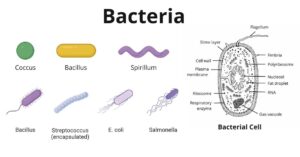
Bacteria: Definition, Characteristics, Examples
Bacteria are a type of simple, microscopic, unicellular organism. In 1675, Dutch scientist A. van Leeuwenhoek was first discovered bacteria. He proved the existence of bacteria in his own made…

Bacteria are a type of simple, microscopic, unicellular organism. In 1675, Dutch scientist A. van Leeuwenhoek was first discovered bacteria. He proved the existence of bacteria in his own made…

In 1822, the scientist Goldfuss first used the term protozoa. Protozoa are referred to as animals whose bodies are made up of a single cell. However, it represents a division…

Kingdom monera are divided into two major groups. One is Archaebacteria and the other one is Eubacteria. Archaebacteria are ancient and most primitive forms of bacteria living in extreme environments.…

Firstly cyanobacteria are kept in as myxophyceae of class algae (blue-green algae). Later some phycologists kept it into Cyanophyceae, while others kept it into Schizophyceae also. On the basis of…